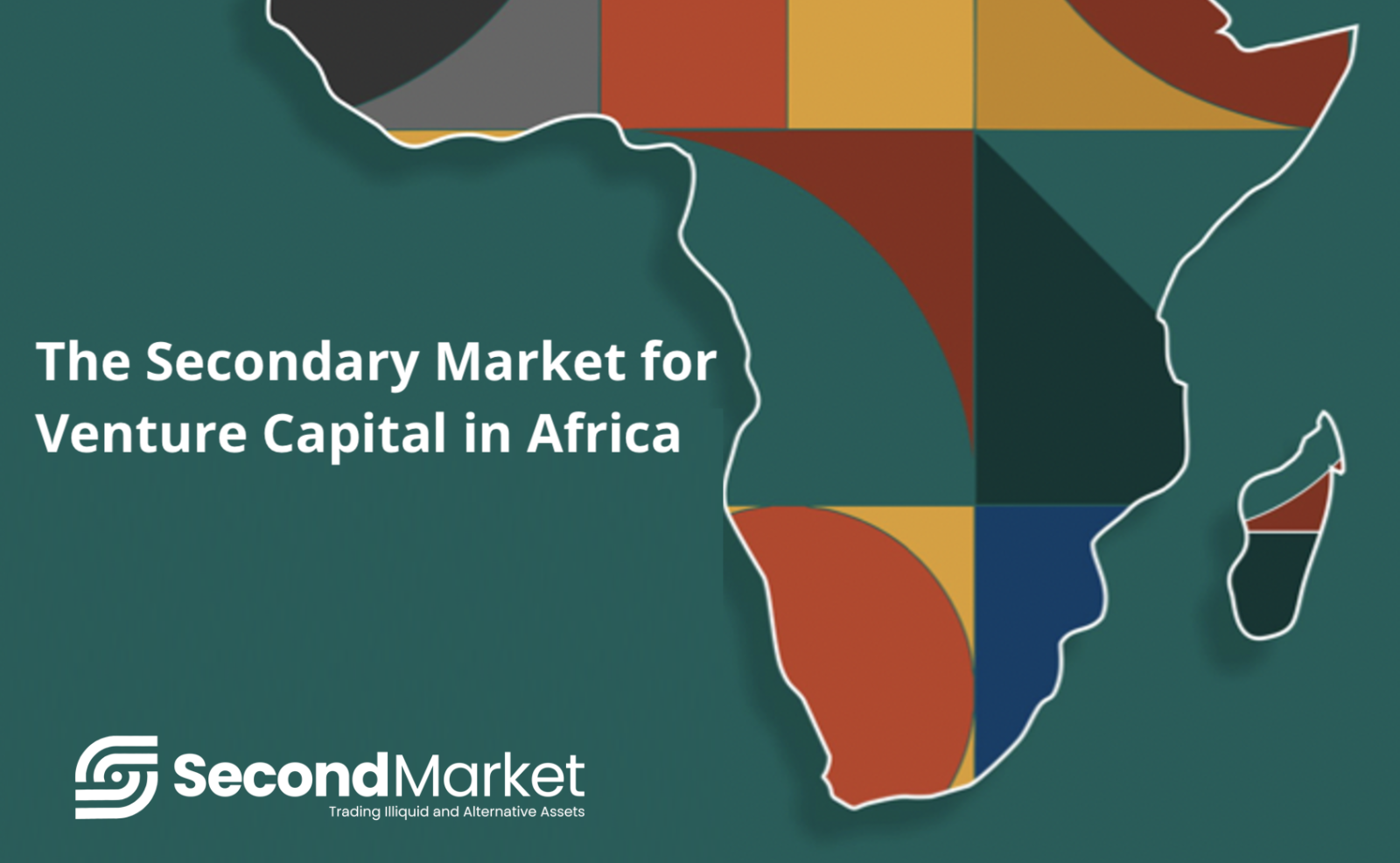Secondaries Market

The Secondary Market for Venture Capital in Africa: An Opportunity for Liquidity Events and the Role of Secondaries Funds
November, 2024
Over the past decade, Africa’s venture capital (VC) landscape has expanded significantly, underpinned by rapid technological adoption, a young and entrepreneurial population, and growing investor interest. Despite these gains, the ecosystem faces a fundamental challenge: a lack of consistent liquidity options for early investors. The secondary market for venture capital offers a compelling solution, particularly through the establishment of secondaries funds that specialize in providing liquidity and optimizing investment outcomes.
The State of Venture Capital in Africa
African startups raised over $6 billion in 2022, showcasing the continent's increasing attractiveness to investors. However, traditional liquidity events, such as IPOs or strategic acquisitions, remain scarce due to factors such as underdeveloped capital markets, regulatory hurdles, and the relatively young age of many startups.
This lack of liquidity leads to prolonged holding periods for investors, deterring many from entering the market and limiting the ability of VC funds to recycle capital into new opportunities.
The Secondary Market: A Solution for Liquidity Events
Secondary markets for VC provide a platform for buying and selling equity stakes in private companies or funds before an official exit. For Africa, this represents an untapped opportunity to:
Unlock Liquidity for Early Investors: Early-stage investors often face significant risk with uncertain exit horizons. Secondary transactions allow them to realize partial or full returns earlier.
Attract More Capital: By offering an alternative exit mechanism, the secondary market can attract institutional and retail investors who might otherwise be hesitant to invest in illiquid assets.
Strengthen the Ecosystem: Secondary sales enable VC funds to recycle capital more efficiently, supporting a new wave of startup funding and ensuring sustained growth in the ecosystem.
Support Founders and Employees: Founders and employees with equity stakes can benefit from liquidity, easing financial pressures while retaining control of their businesses.
The Role of Secondaries Funds in Africa
Secondaries funds are investment vehicles dedicated to acquiring shares in private companies or VC funds on the secondary market. These funds play a critical role in fostering liquidity and stability within the ecosystem:
Providing a Market for Transactions: Secondaries funds create demand for equity stakes, acting as a bridge between sellers (early-stage investors) and buyers (new investors).
Valuation Expertise: By specializing in secondary transactions, these funds can help establish fair market valuations for private African companies, addressing one of the key challenges of secondary markets.
Mitigating Risk: Secondaries funds often focus on acquiring stakes in more mature companies, reducing risk for investors by entering at later stages when business models and market positions are clearer.
Capital Recycling: By acquiring stakes from VC funds, secondaries funds enable these funds to return capital to their investors or deploy it into new ventures, enhancing overall ecosystem efficiency.
Regional Diversification: Secondaries funds can aggregate opportunities across multiple countries and sectors, offering investors a diversified entry point into Africa’s startup ecosystem.
Challenges and Opportunities
While the potential for secondary markets in Africa is vast, several challenges need to be addressed:
Regulatory Barriers: Many African countries lack clear frameworks for secondary transactions, potentially complicating cross-border deals and deterring foreign investors.
Market Depth: Africa’s VC ecosystem is still relatively nascent, and a secondary market requires sufficient deal flow and participants to function effectively.
Information Asymmetry: Reliable financial data on startups and funds is often lacking, complicating due diligence and valuation processes.
Opportunities lie in leveraging technology to overcome these hurdles. Platforms like Capital Engine's Second Market infrastructure could increase transparency, streamline cross-border transactions, and reduce costs. Additionally, partnerships between secondaries funds and local VC firms can help establish trust and operational efficiencies.
Case Studies: Secondary Transactions in Emerging Markets
In Southeast Asia and Latin America, secondary markets have successfully unlocked value for VC ecosystems. For instance, secondary funds in these regions have enabled early investors to exit profitably while providing growth capital for startups. Africa can draw lessons from these markets to structure its secondary ecosystem effectively.
The Future of Secondaries in Africa
As Africa’s VC ecosystem matures, the demand for liquidity solutions will only grow. Setting up a secondaries fund would be well-positioned to meet this demand, acting as catalysts for liquidity, sustainability, and growth. With targeted investments in infrastructure, policy, and market education, the secondary market can become a cornerstone of Africa’s startup ecosystem.
Conclusion
The secondary market for venture capital in Africa represents a transformative opportunity. By creating liquidity for investors and supporting the growth of startups, this market can help address the current challenges facing the ecosystem. The establishment of a secondaries funds, in particular, could play a pivotal role, bridging the gap between early-stage risk and late-stage opportunity. With the right strategies, this market can unlock billions in untapped potential, fueling innovation and economic growth across the continent.
About Capital Engine®
Capital Engine® provides forward-thinking organizations with efficient and scalable private capital and investor management solutions, for both traditional and digital assets.
Built for high-performance capital raising, our technology helps leverage the opportunity to better originate and showcase a diverse selection of private investment deals and offer these to investors i.e. a deal’s potential viability can be better assessed, market appetite determined and transaction promptly closed.
Our clients include broker dealers, family offices, wealth managers, incubators, accelerators, social impact and real estate funds, in providing customized SaaS solutions to power private capital and alternative investment platforms, with a strong focus on investor management services.
Interested in Raising Capital
Request a Call / Demo
The State of Venture Capital in Africa
African startups raised over $6 billion in 2022, showcasing the continent's increasing attractiveness to investors. However, traditional liquidity events, such as IPOs or strategic acquisitions, remain scarce due to factors such as underdeveloped capital markets, regulatory hurdles, and the relatively young age of many startups.
This lack of liquidity leads to prolonged holding periods for investors, deterring many from entering the market and limiting the ability of VC funds to recycle capital into new opportunities.
The Secondary Market: A Solution for Liquidity Events
Secondary markets for VC provide a platform for buying and selling equity stakes in private companies or funds before an official exit. For Africa, this represents an untapped opportunity to:
Unlock Liquidity for Early Investors: Early-stage investors often face significant risk with uncertain exit horizons. Secondary transactions allow them to realize partial or full returns earlier.
Attract More Capital: By offering an alternative exit mechanism, the secondary market can attract institutional and retail investors who might otherwise be hesitant to invest in illiquid assets.
Strengthen the Ecosystem: Secondary sales enable VC funds to recycle capital more efficiently, supporting a new wave of startup funding and ensuring sustained growth in the ecosystem.
Support Founders and Employees: Founders and employees with equity stakes can benefit from liquidity, easing financial pressures while retaining control of their businesses.
The Role of Secondaries Funds in Africa
Secondaries funds are investment vehicles dedicated to acquiring shares in private companies or VC funds on the secondary market. These funds play a critical role in fostering liquidity and stability within the ecosystem:
Providing a Market for Transactions: Secondaries funds create demand for equity stakes, acting as a bridge between sellers (early-stage investors) and buyers (new investors).
Valuation Expertise: By specializing in secondary transactions, these funds can help establish fair market valuations for private African companies, addressing one of the key challenges of secondary markets.
Mitigating Risk: Secondaries funds often focus on acquiring stakes in more mature companies, reducing risk for investors by entering at later stages when business models and market positions are clearer.
Capital Recycling: By acquiring stakes from VC funds, secondaries funds enable these funds to return capital to their investors or deploy it into new ventures, enhancing overall ecosystem efficiency.
Regional Diversification: Secondaries funds can aggregate opportunities across multiple countries and sectors, offering investors a diversified entry point into Africa’s startup ecosystem.
Challenges and Opportunities
While the potential for secondary markets in Africa is vast, several challenges need to be addressed:
Regulatory Barriers: Many African countries lack clear frameworks for secondary transactions, potentially complicating cross-border deals and deterring foreign investors.
Market Depth: Africa’s VC ecosystem is still relatively nascent, and a secondary market requires sufficient deal flow and participants to function effectively.
Information Asymmetry: Reliable financial data on startups and funds is often lacking, complicating due diligence and valuation processes.
Opportunities lie in leveraging technology to overcome these hurdles. Platforms like Capital Engine's Second Market infrastructure could increase transparency, streamline cross-border transactions, and reduce costs. Additionally, partnerships between secondaries funds and local VC firms can help establish trust and operational efficiencies.
Case Studies: Secondary Transactions in Emerging Markets
In Southeast Asia and Latin America, secondary markets have successfully unlocked value for VC ecosystems. For instance, secondary funds in these regions have enabled early investors to exit profitably while providing growth capital for startups. Africa can draw lessons from these markets to structure its secondary ecosystem effectively.
The Future of Secondaries in Africa
As Africa’s VC ecosystem matures, the demand for liquidity solutions will only grow. Setting up a secondaries fund would be well-positioned to meet this demand, acting as catalysts for liquidity, sustainability, and growth. With targeted investments in infrastructure, policy, and market education, the secondary market can become a cornerstone of Africa’s startup ecosystem.
Conclusion
The secondary market for venture capital in Africa represents a transformative opportunity. By creating liquidity for investors and supporting the growth of startups, this market can help address the current challenges facing the ecosystem. The establishment of a secondaries funds, in particular, could play a pivotal role, bridging the gap between early-stage risk and late-stage opportunity. With the right strategies, this market can unlock billions in untapped potential, fueling innovation and economic growth across the continent.
About Capital Engine®
Capital Engine® provides forward-thinking organizations with efficient and scalable private capital and investor management solutions, for both traditional and digital assets.
Built for high-performance capital raising, our technology helps leverage the opportunity to better originate and showcase a diverse selection of private investment deals and offer these to investors i.e. a deal’s potential viability can be better assessed, market appetite determined and transaction promptly closed.
Our clients include broker dealers, family offices, wealth managers, incubators, accelerators, social impact and real estate funds, in providing customized SaaS solutions to power private capital and alternative investment platforms, with a strong focus on investor management services.
Interested in Raising Capital
Request a Call / Demo
Latest Articles





